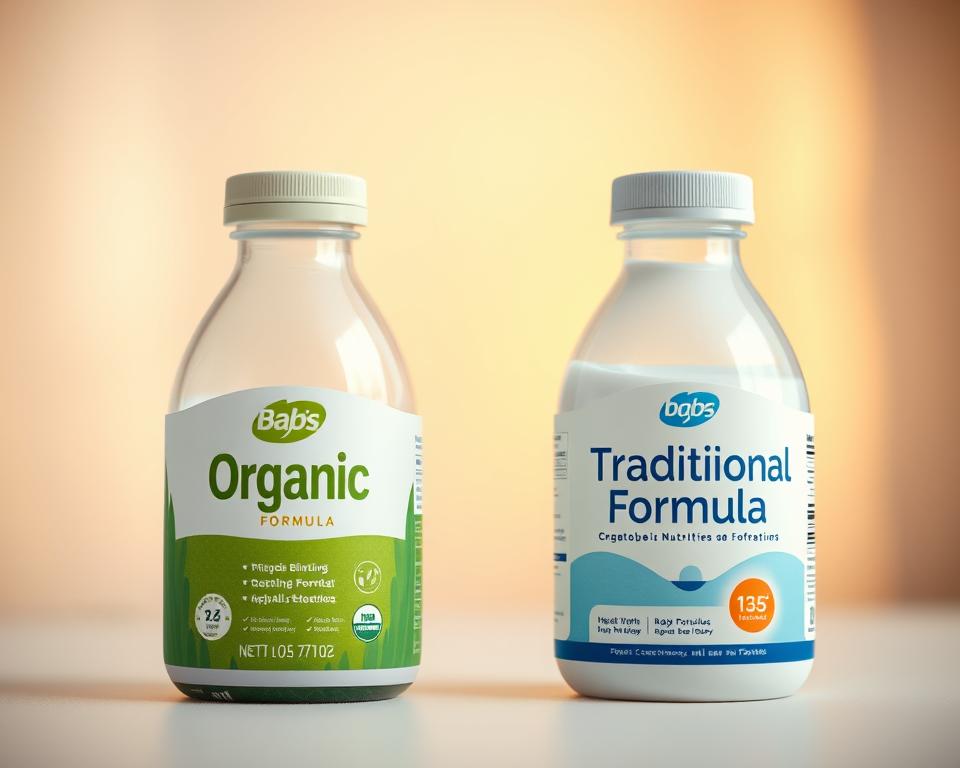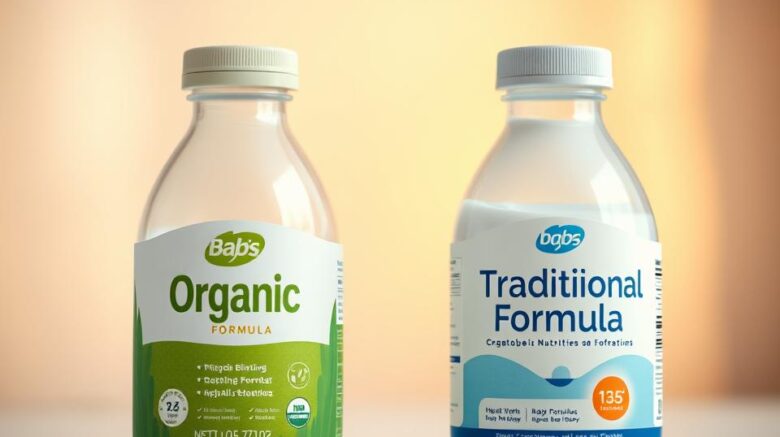Locate the Finest Organic Baby Formulas: A Parent’s Guide
Nearly 80% of parents in the United States use baby formula at some point in their infant’s first year. Lactation difficulties frequently cause this shift. Selecting the proper Baby milk organic proves crucial for such households. This guide aims to assist parents in making informed decisions about the best organic formula for their babies.
We’ll review key brands and blends with an eye on purity and nutrients. These insights are critical for a wholesome infant beginning.
Deciding on infant nourishment ranks among the most important parental tasks. Interest in organic-based baby formulas has risen sharply. It offers a cleaner feeding alternative. Organic products avoid synthetic pesticides and fertilizers, giving your little one a cleaner start.
Moms and dads value formulas free from GMOs and synthetic extras. Such concerns drive the trend toward organic as a safer nutritional path.
Perks of Using Organic Elements
Certified organic components deliver notable advantages. These ingredients are rigorously tested, ensuring higher quality and safety. Selecting these formulas ensures infants escape dangerous additives.
These agricultural standards promote long-term environmental health. Hence, selecting organic amplifies wellness and ecological care.
Related Developmental Gains
The health advantages of organic formula reflect a positive impact on infant development. Evidence indicates organics can reduce digestive upset and allergy chances. This can be attributed to the pure formulation free from synthetic additives.
Caregivers appreciate the peace of mind from these well-rounded formulas. Such formulas aid healthy growth and general well-being.

Key Features to Look for in Organic Baby Formula
Choosing the best organic baby formula is a critical decision for a baby’s health. It’s important to consider the protein sources and the essential nutrients. How proteins are sourced and balanced impacts digestion and nourishment. Awareness of critical vitamins and fats secures optimal development and health.
Protein Sources and Ratios
Most baby formulas use whey and casein as protein sources. Whey is easier to digest, while casein provides a slow release of nutrients. More whey generally equals gentler digestion for infants. Many organic options boost whey content for digestive comfort. Look for formulas that clearly list their protein sources and have a balanced ratio for healthy growth.
Vital Additives and Health Boosters
Critical nutrients make a big difference in formula selection. DHA/ARA essential for cognitive and ocular growth. Including prebiotics helps establish gut flora and immunity. Check for these additives in formulas to ensure your baby gets a full range of nutrients. Organic formulas that focus on these nutrients offer a rich source of nutrition.
| Protein Source | Benefits | Whey-to-Casein Ratio |
|---|---|---|
| Whey | Easier digestibility|Gentle on tummies|Quick absorption | Higher ratio is better|Lean whey blend preferred|Above 60% ideal |
| Casein | Slow release of nutrients|Sustained nourishment|Stomach-friendly over time | Lower ratio preferred in early months|Casein kept minimal|Around 40% or less |
Leading Organic Formula Labels
Caregivers frequently choose reputable names for organic formula. Below are notable labels and what makes them special. They lead the organic formula market, serving diverse dietary demands.
Kendamil: The Whole Milk Option
Kendamil is unique as the only organic baby formula made with whole milk. This formula boasts a rich, creamy texture and avoids controversial additives. It’s a top pick for parents who value purity in their baby’s diet. You can easily purchase Kendamil with a few clicks.
HiPP Combiotik’s Soothing Formula
HiPP Combiotik is crafted to be gentle on sensitive stomachs. It includes prebiotics and probiotics for better digestion. Parents often choose HiPP for its commitment to organic, high-quality ingredients, making it a favorite in organic baby food shops.
Holle’s Biodynamic Organic Formula
Famed for biodynamic standards, Holle Bio ensures top-quality organics. It’s known for its rigorous quality control and commitment to health and the environment. Parents trust Holle for its authentic taste and nutrition.
Aussie Bubs Grass-Fed Blend
Its grass-fed milk basis boosts vitamins and minerals naturally. It offers organic ingredients that align with a natural feeding philosophy. Its unique approach makes it easy for parents to spot quality in organic baby formulas.
Bobbie’s Forward-Looking Formula
Bobbie is at the forefront of baby nutrition, blending modernity with thoughtful formulation. Balances modern nutrition science with certified organics. Parents value Bobbie’s nutritional approach as they navigate baby feeding.
Choosing the right organic formula for your baby requires careful thought about their dietary needs. Accounting for sensitivities ensures a comfortable feeding experience. Formula makeup plays a huge role in easing infant digestion.
Identifying Feeding Intolerances
Infants can respond poorly to lactose or intact proteins. Look for formulas designed for sensitive infants. Sensitive blends reduce lactose or include pre-broken down proteins. They help alleviate discomfort and support healthy digestion.
Always consult a pediatrician to determine the most suitable formula for your baby’s specific needs.
Prioritizing Gut Ease
A happy belly starts with an appropriate formula choice. These compounds encourage a healthy microbiome and smoother digestion. They help in developing a healthy gut flora, improving digestion and nutrient absorption.
Mothers supplementing with formula can find options mimicking breast milk nutrients.
Steps to Switch to Organic Formula
You can transition infants from breastfeeding or standard formula to organic smoothly. Knowing the right approach helps both caregiver and infant adjust. Incremental adjustments support baby’s adaptation to new formula.
Phased Introduction
Begin with small amounts of organics mixed in. Follow these tactics for easy switching:
- Mix ¼ organic into ¾ existing formula to start.
- Over the next week, gradually increase the proportion of organic formula while decreasing the traditional formula.
- Watch for fussiness or digestion changes and adjust pace as needed.
- Provide organics at predictable times for positive associations.
- Stick to a feeding routine, as consistency can make the transition smoother.
Indicators of Successful Switching
Spotting these indicators confirms a smooth adaptation:
- Baby nurses or bottles quietly and contentedly.
- Regular bowel movements and digestion remain consistent.
- No significant changes in appetite or feeding patterns.
- Baby smiles and rests peacefully after meals.
Patience pays off—look for these signs for a favorable outcome.
Comparing Organic and Regular Custom Formulas
Many parents are torn between organic baby formula and traditional formula when it comes to their infant’s nutrition. Making the right pick ensures optimal nutrition for little ones. Concern over pure components and wellness perks drives the decision.
Ingredient Differences
What goes into each formula type highlights their distinction. They feature only certified organic elements, omitting artificial chemicals. Names like HiPP, Kendamil partner with organic producers for premium milk. On the other hand, traditional formulas might include synthetic nutrients or non-organic ingredients. It explains why caregivers favor organics for a natural approach.
Cost Comparison
Organic formulas generally carry premium pricing because of certification expenses. These formulas cost more because of strict organic compliance fees. Caregivers often deem the extra expense justified by wellness gains. Understanding the price and perceived value helps parents make a choice that fits their budget and values.
The rise of online organic formula shops has revolutionized how parents buy organic baby formula. Caregivers order premium blends with a few clicks. This change broadens access to a wider variety of brands and formulas, meeting diverse dietary requirements.
Buying Formula Online Perks
E-commerce fits into jam-packed daily routines. Convenience: Order from anywhere without the need to visit a store.
- Ease of access
- Broad brand offerings via online catalogs
- Competitive Pricing: Take advantage of promotions and discounted prices often available through online retailers
Formula Subscription Benefits
Subscription models now dominate formula provisioning. They make buying formula easier by setting up regular deliveries of your preferred formulas.
Key features of infant formula subscriptions include:
- Regular shipments keep cabinets full
- Customizable Frequency: Choose how often to receive deliveries based on your family’s needs
- Subscription rates often beat retail prices
Compliance Requirements for Organic Formulas
Maintaining high standards for organic formulas involves strict oversight. This is governed by multiple compliance layers. Parents can rest assured knowing that FDA regulations on infant formula ensure safety. The USDA organic certification, on the other hand, verifies the authenticity of organic claims. Knowing compliance details aids in making the best decisions.
Federal Formula Guidelines
The Food and Drug Administration sets essential formula rules. They mandate specific vitamin, mineral, and protein levels plus allowable additives. This ensures that each formula meets the nutritional needs of a growing baby. Main elements are:
- Mandatory ingredient listings|Required ingredient disclosures|Compulsory component labeling
- Specific nutrient requirements such as protein, fats, and vitamins|Defined macro- and micronutrient thresholds|Preset nutrition minimums
- Comprehensive quality control measures during manufacturing|Rigorous production inspections|Stringent safety checks
Following these rules means infants receive only approved formulas.
USDA Organic Certification Guidelines
These certifications confirm true organic sourcing and handling. It includes multiple verification steps to ensure compliance. Key criteria include:
- Proof that ingredients are produced without synthetic fertilizers or pesticides|No chemical fertilizers or sprays used|Farm inputs must be 100% natural
- Verification of non-GMO (genetically modified organism) status|Guarantee of GMO-free sourcing|Strict non-GMO testing
- Clear guidelines on the handling and processing of organic products|Protected organic integrity during production|Certified organic processing rules
USDA-approved organics guarantee farm-level purity. It secures a cleaner start for baby nutrition. The combination of USDA certification with FDA regulations provides parents with confidence in their baby’s nutrition.
| Regulatory Aspect | Description |
|---|---|
| FDA Regulations | Sets safety and nutrient standards for infant formula |
| USDA Organic Certification | Ensures organic ingredients are grown without harmful substances |
| Quality Control | Mandatory checks during production processes |
| Ingredient Transparency | Clear labeling of all components for consumer knowledge |
Buying Guide for Organic Formulas
Deciding on the best organic option can appear complex. But with key tips, parents can confidently select the best option. Being aware of sources and certifications eases the purchase.
Where to Buy Organic Baby Formula Online
Multiple web shops carry extensive organic formula lines. These sites frequently run promotions. Consider these popular options:
- Amazon – Renowned for choice and quick dispatch
- Target – Provides flexible shipping and pickup services
- Walmart – Combines web ordering and brick-and-mortar access
- Thrive Market – Focuses on health-conscious products, including organic options
Review shopper comments for real-world insights. Ratings reveal formula efficacy and seller trustworthiness.
Certification Guide
Interpreting certifications prevents misinformed purchases. Check for recognized organic marks. Common ones include:
| Certification | Description |
|---|---|
| USDA Organic | Indicates the formula contains at least 95% organic ingredients |
| Non-GMO Project Verified | Means the formula does not use genetically modified organisms |
| European Union Organic | Denotes adherence to EU organic farming regulations |
Knowing these certifications ensures the formula is not only nutritious but also safe for your baby.
Final Thoughts
In summary, the right organic choice shapes infant wellness significantly. Organic baby food offers more than just ingredients; it ensures your child’s overall well being. It provides vital nutrients without harmful additives. Moms and dads learned to evaluate proteins, allergies, and trusted labels such as HiPP and Holle.
Our guide underscored customizing choices to your baby’s health. Transitioning to organic options should be a careful process. It should ensure a gradual shift that prioritizes your child’s comfort and health.
Guided by these pointers, you’ll choose with confidence from many choices. Choosing organics lays a foundation for enduring wellness. Let’s continue to prioritize quality nutrition for our babies. Empower early eating habits with carefully selected organics.
